- Home
- Warhammer 40K
Forge Master - David Annandale Page 2
Forge Master - David Annandale Read online
Page 2
What are you? The question did not have the easy answer it should.
He reached the enginarium. This would be his field in the battle ahead. He would be guardian of the Verdict of the Anvil, preserving its spirit and maintaining its body as the ship brought the fury of Vulkan down on the long-awaited foe. Surrounded by machines, immense beasts of metal flesh and plasma heart, he was among kin. Litanies of battle, sanctity and calm sprang to his lips. He began his communion with his gargantuan charge, preparing the ship for the fight. Tech crew and servitors flew to the tasks he assigned them, and the cavernous space echoed with the thrum and clatter of a collective action as perfectly timed and choreographed as it was precise. The question’s refrain faded into the background of Ha’garen’s consciousness as he became one with the Verdict.
The mechanistic dance of war began.
On the main tacticarium screen, Mulcebar watched the enemy transition into the materium. The ork warlord was coming in strong. The massive kill kroozer was escorted by a cluster of attack and ram ships. Mulcebar was looking at a storm system of brute aggression. The squadron was an expression of greenskin nature. The ships were ramshackle, blunt in form and function, and dangerous in the extreme. The very fact that, against all logic, they did not spontaneously explode was itself a sign that to underestimate the orks would be suicidal.
The Verdict of the Anvil was massively outnumbered. It was alone.
It was more than strong enough. The predator waited, silent, running dark, for the orks to come within range.
‘Nova cannon powering up,’ Phanes reported.
‘Thank you, helmsmaster,’ Mulcebar answered. He would strike the ork kroozer a death blow, then close in to exterminate surviving ships. He planned to avoid close-quarters fighting. The decision was a pragmatic one. A commander who rushed in to grapple with the orks was playing the greenskins’ game, and was a fool. There was nothing heroic in throwing away the lives of warriors and crew. This ork, through the schemes of his underlings, had already proven himself the most dangerous of his kind Mulcebar had ever heard of, barring the beast of Armageddon. But he would shortly be ash. Mulcebar eyed the screens, waiting for the nova cannon to be fully charged, and for the target to be acquired. As yet, the ork squadron showed no sign of being aware of the Verdict of the Anvil’s presence.
‘Target within range,’ the gunnery officer called out.
And the cannon was ready. Mulcebar opened his mouth to give the order.
Then the astropathic choir sang, and changed everything.
The music of the gears had been disrupted. The hymns of the engines were unsung. The captain had summoned him to the bridge. When he arrived, Ha’garen saw that Ba’birin and all the other squad leaders had been assembled too. A second full briefing, so soon after the last, and a critical action aborted. The Techmarine did not like the portents.
Mulcebar’s expression also boded ill. It was thunderous with frustration and distaste. ‘Brothers,’ he said, ‘I have received a communication whose urgency is matched only by its timeliness.’ He spat the last word. Ha’garen had never seen his captain in a rage. This came close.
Mulcebar paused for a moment before continuing. When he spoke again, his tone was a bit more phlegmatic, as if he recognised the need for what he was going to say, bitterly though he might resent it. ‘The message is from the Stormseer of the White Scars. We cannot destroy our foe’s ship. We must board it.’ He grimaced, as if his next words left a sour taste in his mouth even before being spoken. ‘We must board it and extract an eldar prisoner.’
There was a moment of silence. Ha’garen had seen a familiar light blaze up in Ba’birin’s eyes at the mention of a boarding action, and his battle-brother would not be alone, he knew, in relishing the idea of taking the battle to the orks on a more personal level. But the mission the captain had just described was obscene.
‘Extract...?’ Neleus began.
‘Alive,’ Mulcebar clarified.
‘In Vulkan’s name,’ Ba’birin said softly. ‘Captain, why?’
‘Our brothers in the Raven Guard have been encountering orks that are very large and aggressive. Unnaturally so, as if anything about the greenskins can be said to be natural. The strength they are demonstrating is of great concern, however.’
‘What does this have to do with our rescuing an eldar?’ Neleus asked.
‘He is a seer and he knows why this is happening,’ Mulcebar answered. ‘Our duty, as distasteful as it might be, is clear. We must board the ork ship, find the eldar, and extract him.’ His voice turned grim with menace. ‘We will then take what we need to know from him.’
It had been a long time since Ha’garen had experienced anything that he would have described as visceral. He did so now. The racial memory of millennia of slaver raids on the people of Nocturne rose in his blood. It demanded satisfaction. That Nocturne was a stalking ground for the dark eldar and not their less hedonistic kin was, for every Salamander, a distinction without a difference. The mission was perverse. Its irony had a tactile cruelty.
‘The boarding party will consist of two tactical squads,’ Mulcebar said, ‘led by Sergeants Ba’birin and Neleus.’ He turned to Ha’garen. ‘Brother,’ he said, ‘your skills will be especially needed. We do not know anything about the layout of the ship, much less where the prisoners might be held. Learn everything you can. Guide your brothers.’
Ha’garen lowered his head. ‘In Vulkan’s name,’ he said, ‘and with his aid, I will complete this task.’ When he looked up, he noticed the look on Ba’birin’s face. The other Salamander’s lack of expression was eloquent.
The predator had been preparing itself for war. It still was, but for a very different sort. The engines powered up, and the walls of stone and steel vibrated with their gathering strength. The Verdict of the Anvil was going to plunge into the ork maelstrom. It would be hunting hard prey.
In the solitorium, Ba’birin also prepared for war. He was engaged in a private communion with his primarch before joining his brothers for the communal prayer. His weapons had been cleaned, loaded and anointed. They and his armour, and the priest who would dress him in his raiment of war, awaited him in the next chamber. Here, only Akakios, his brander-priest, waited on him. Clad in a loin-cloth, Ba’birin knelt over a fire pit. The heat from the incandescent coals washed over him. He opened his flesh and soul to the purifying sear of the forge, the strengthening pain of the anvil. He thought about the mission, and made himself confront all the elements of it that rankled. He focused most of all on the rescue of the eldar prisoner. He brought all of his revulsion and hatred for that race to the surface, and gave himself over to a spasm of absolute fury. He gave his anger to the fire, so that the forge burned the extraneous emotions away, leaving only duty. When he felt his rage retreat before a calm that was no less implacable, no less determined, he rose and turned to face Akakios.
‘I am ready,’ he told the priest.
Akakios stepped forwards. The serf’s narrow, ascetic face was a lined map of age and piety. He placed the end of his branding rod in the fire pit, heating it to a red glow. Then he brought it up to Ba’birin’s chest. To a topography of victories and pledges, he added the brand of another holy promise. Ba’birin stood motionless as he accepted the pain. It was the symbol of duty and its reminder. It was the mark of this mission, binding his life to its completion. The calm he had achieved absorbed the pain and honoured it. Cleansed, steeled, determined, he strode out of the chamber to don his armour.
When he emerged from the solitorium, he found Neleus waiting for him, helm under his arm. ‘Brother-sergeant,’ he said, nodding in greeting.
‘Brother-sergeant,’ Ba’birin returned. ‘Shall we?’ He began to walk down the hallway, heading for the ramps that would take them down to the torpedo deck.
‘Would you indulge my curiosity for a moment?’ Neleus asked.
Ba’birin paus
ed, his precious calm fraying ever so slightly. ‘Of course,’ he answered, though an intuition told him that he should not be eager to hear Neleus’s question.
‘You have your doubts about Techmarine Ha’garen’s role in this mission, don’t you?’
Ba’birin gave a soft, rueful laugh at his own expense. In his meditation of purging, he had concentrated so completely on the eldar that he had avoided confronting his other source of disquiet. And now here was Neleus, the unknowing tool of fate, to punish him for his dishonesty. Ba’birin accepted his chastisement as his due. ‘Was I that obvious?’ he asked.
‘Hardly,’ Neleus said, sounding amused as well as concerned. ‘You didn’t react at all.’
‘And that was, in itself, a reaction.’
‘Given the former cohesion of your fighting unit, yes.’
‘You think I don’t trust Brother Ha’garen.’
‘So it would appear.’
‘And so it is,’ Ba’birin admitted. ‘I do not.’
‘You blame his conversion to Techmarine?’
‘I do.’ Ba’birin began walking again, slowly. ‘I believe that he has divided loyalties. I believe that he is finding it difficult to reconcile the Cult Mechanicus and the Promethean Creed. And so I believe that his judgement is suspect.’
Neleus frowned. ‘Forgive me, brother, but you speak as if Techmarines were unknown in our Chapter.’
‘I am not speaking in general. I have the most profound...’
‘... trust?’ Neleus put in.
‘Respect,’ Ba’birin finished, ‘for our three Masters of the Forge. But I can see the difference between Ha’garen as he was and as he now is, and some of his decisions are unsound.’
‘If you are referring to what happened at Heliosa, his actions were entirely justifiable from a tactical perspective.’
‘That they were justifiable doesn’t make them right.’
Neleus shrugged but said nothing, and they walked on in silence for a minute. Ba’birin wasn’t sure whether to read agreement or dissent on Neleus’s part. The other sergeant was one of the most even-tempered souls Ba’birin had ever encountered. Though his ferocity in battle was a sight to behold, and he did not admit even to the mere existence of the word ‘retreat,’ his attitude towards war was very different from Ba’birin’s. The distinction lay, Ba’birin thought, in the fact that where he saw war as the destruction of enemies, Neleus saw instead the defence of the Imperium, of their home world, and of the innocent. Ba’birin exulted in the furnace of conflict, and for this he made no apologies, but he respected Neleus’s more measured philosophy. It was often a valuable corrective when his own enthusiasms threatened to get the better of him. And he had no quarrel with Neleus’s sense of priority. In the end, Ba’birin too fought to preserve, no matter how enthusiastically he sought the fight. So he was surprised that Neleus showed any sympathy at all for Ha’garen’s choice at Heliosa.
Neleus did not speak again until they had almost reached the torpedo deck. ‘Are you really doubting his loyalty? Because if you are, then you must, in good conscience, warn the captain and the Chaplain.’
Ba’birin sighed. ‘No,’ he said. ‘I’m sure he is loyal, or at least that he believes himself to be.’
‘Meaning?’
‘In leaving the flesh behind, he is forgetting that he is not a machine, and that he should not be thinking like one. If he loses all connection with the fact that we are, all of us, however much we have been transformed, human, then he will make decisions that will take nothing human into account. In the field, those decisions could have terrible consequences.’
‘I see.’ Neleus’s tone was neutral, non-committal, and Ba’birin couldn’t tell if he agreed or not. But at least Neleus was following the thread of his logic. ‘And we are about to embark on a mission that will require Ha’garen to immerse himself in machinery of xenos design,’ Neleus said. ‘If he should lose himself in the inorganic, he might act only in its interests.’
‘And we will be in his hands,’ Ba’birin finished.
The torpedo deck opened up before them. Nestled low in the hull, it was an immense temple consecrated to the destruction of enemies. Row upon row of tubes lined walls that rose dozens of metres. Gantry cranes and gangways fed servitors and ordnance to their positions. At the forward end, a colossal bas-relief sculpture of Vulkan dominated the space. The primarch’s hammer was smashing an anvil, and flashing outwards from the blow were the streaks of torpedoes, bound on their missions of righteous punishment.
The squads were assembled. The parchments of new oaths of moment hung from the armour of the Space Marines, fluttering slightly in the light breeze of the ventilation system. The Salamanders were gathered to pledge unity and duty. In their reptile-green armour emblazoned by the snarling profile of their namesake, they were the most honourable of paradoxes. They were both drake and knight. They were self-reliance and devotion to brotherhood. And at their gathering, Ba’birin’s chest never failed to swell with pride and humility.
Ha’garen was standing in the shadows cast by a lume-strip shining through a walkway. He was motionless, his servo-arms folded behind his back. He might have been an empty suit of armour but for the intensity of the red glow behind his eye lenses. He was standing beside the access hatch to a boarding torpedo. Ba’birin felt another wave of unease as he regarded his old friend. Then he felt shame. Not because of his suspicions, but because they made him a hypocrite as he entered into the rituals that bound the Salamanders to each other and to their cause.
It was almost a relief when, with the blaring of klaxons, war came early.
CHAPTER TWO
There were glories to war, and there were curses. The greatest curse, as far as Mulcebar was concerned, was the madness that attended it. It was not battle itself that was madness. What was mad was the contingencies of action and perversities of fate that forced a commander to issue orders that he knew to be foolish. So it was now. He was going to close with the orks. He was committing himself to an action he would decry as the height of stupidity in any other circumstance. And he was hurling his company into a suicidal confrontation in order to rescue a single eldar. Some of his more mystically inclined fellow officers might see the compounding ironies as a sign of fate. Perhaps they were right. He had no interest in working out the philosophical niceties of his war. But as he launched an assault that had nothing to do with pragmatism and everything to do with an idealistic, death-or-glory charge, he took solace in the fact that it was not naiveté but duty that forced his hand. He would not mourn any warriors who fell in the performance of duty. He would honour their deaths, and accept his own, but regret and sorrow were the province of the weak and the faithless. This battle, here, now, in all of its madness, was the new anvil upon which Fifth Company would be tested, and if this were the path drawn by Vulkan that would lead the company to its destiny, then Mulcebar welcomed it. He also blessed the efforts of the White Scars and the Raven Guard that had lured the Overfiend into the open, and so made this test a reality. The task that loomed was formidable; without the blows struck by the other Chapters, it would have been impossible.
But though the Salamanders would be shaped against the anvil, they would also be a hammer themselves.
‘Full ahead,’ Mulcebar ordered. ‘Prioritise fire on the escorts.’
The Verdict of the Anvil lunged forwards from the darkness of the void, plasma engines flaring, their nova brilliance a roar of challenge to the ork ships. The greenskins responded in kind, and war rushed to meet the strike cruiser. The Verdict closed at a right angle to the course of the squadron. On the tacticarium screens, Mulcebar had a last look at the flank of the kroozer, a massive target begging for the judgement of the nova cannon, and then shifted his focus to the escorts. The smaller ships were peeling away from their charge. There were six of them, their guns already flashing though they were not yet within range.
&
nbsp; ‘Approaching ork escort ships,’ a servitor intoned. It was slaved to the long-range augurs. ‘Three pairings. Designations: Onslaught, Ravager, Brute.’
Technical data appeared on Mulcebar’s screens. It was unnecessary. The names had told him what he needed to know, and the comparisons between the ork forces and the Verdict’s strength were clear in his mind. The Verdict was faster than all the enemy ships except the Brutes. It had better shields. It was so much more manoeuvrable than the kroozer that it could dance circles around its foe. But it could not do the same to the escorts. The Onslaughts and the Ravagers were clumsy ships, but they could still turn faster than the Verdict. Then there were the Brutes. They were fast, agile, and they rammed.
Still, it was the kroozer that represented the orks’ biggest advantage. Not because it was solid as a greenskin’s skull and could absorb horrific damage, but because Mulcebar could not attack and destroy it.
‘Ten seconds to range,’ the gunnery officer reported.
The seconds Mulcebar ten seconds had left to decide his opening strategy. He didn’t need them. There was only one path to follow. The Salamanders had to board the ship. Now. So the attack would be as risky as it would be savage: blast through the escorts, launch the boarding torpedoes on a near approach to the kroozer, then withdraw and shadow.
Simple.
He doubted the orks would cooperate.
‘Maintain full ahead,’ Mulcebar ordered. ‘Prow cannons, fire on Ravagers. Port and starboard batteries, prepare for flanking attacks.’

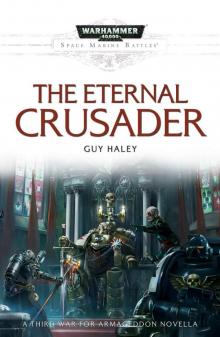 The Eternal Crusader - Guy Haley
The Eternal Crusader - Guy Haley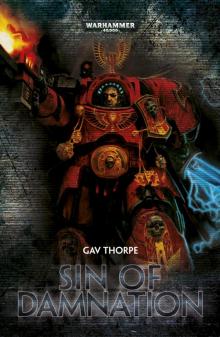 Sin of Damnation - Gav Thorpe
Sin of Damnation - Gav Thorpe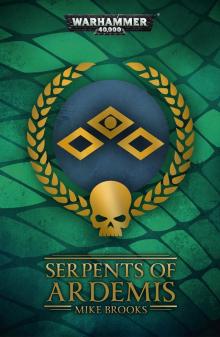 Serpents of Ardemis - Mike Brooks
Serpents of Ardemis - Mike Brooks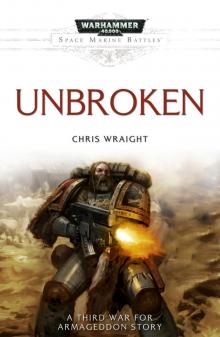 Unbroken - Chris Wraight
Unbroken - Chris Wraight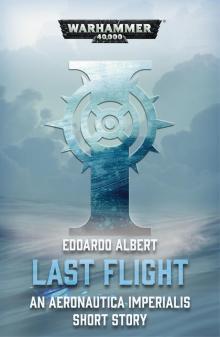 Last Flight - Edoardo Albert
Last Flight - Edoardo Albert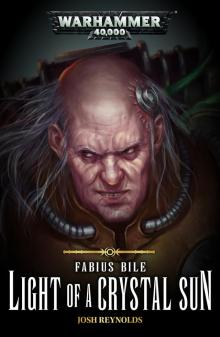 Light of a Crystal Sun - Josh Reynolds
Light of a Crystal Sun - Josh Reynolds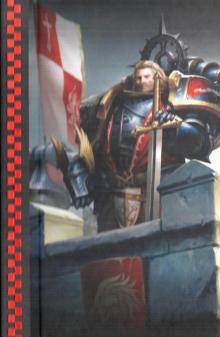 Lion El'Jonson- Lord of the First - David Guymer
Lion El'Jonson- Lord of the First - David Guymer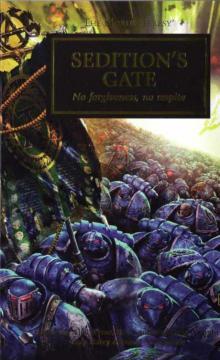 Sedition's Gate - Nick Kyme & Chris Wraight
Sedition's Gate - Nick Kyme & Chris Wraight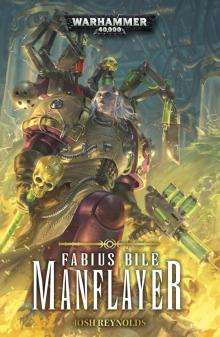 Manflayer - Josh Reynolds
Manflayer - Josh Reynolds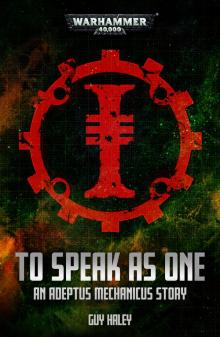 To Speak as One - Guy Haley
To Speak as One - Guy Haley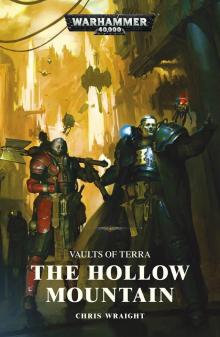 Vaults of Terra- The Hollow Mountain - Chris Wraight
Vaults of Terra- The Hollow Mountain - Chris Wraight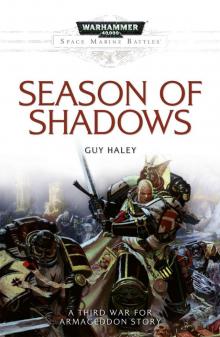 Season of Shadows - Guy Haley
Season of Shadows - Guy Haley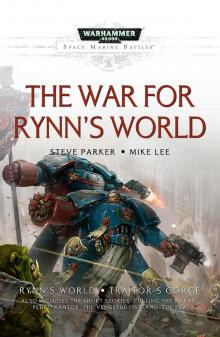 The War for Rynn's World - Steve Parker & Mike Lee
The War for Rynn's World - Steve Parker & Mike Lee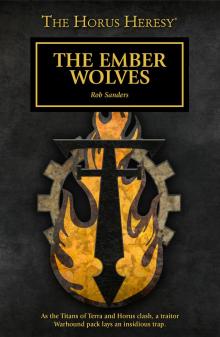 The Ember Wolves - Rob Sanders
The Ember Wolves - Rob Sanders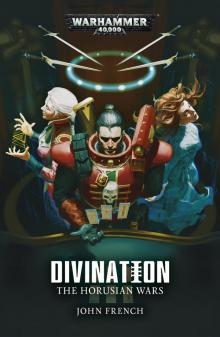 Divination - John French
Divination - John French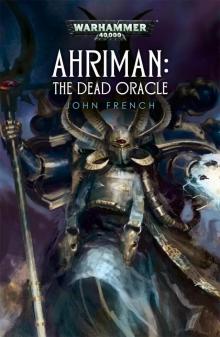 The Dead Oracle - John French
The Dead Oracle - John French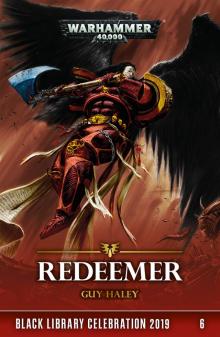 Redeemer - Guy Haley
Redeemer - Guy Haley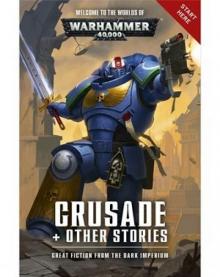 Crusade & Other Stories - Dan Abnett Et Al.
Crusade & Other Stories - Dan Abnett Et Al.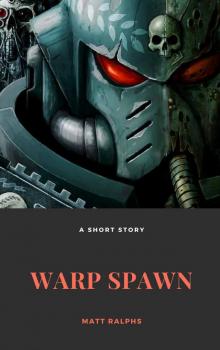 Warp Spawn - Matt Ralphs
Warp Spawn - Matt Ralphs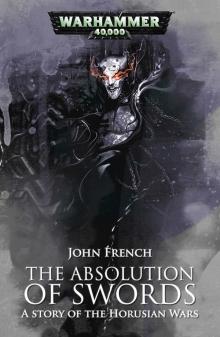 The Absolution of Swords - John French
The Absolution of Swords - John French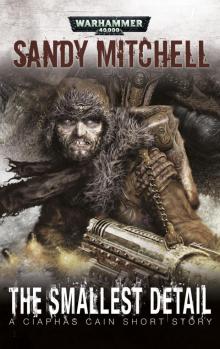 The Smallest Detail - Sandy Mitchell
The Smallest Detail - Sandy Mitchell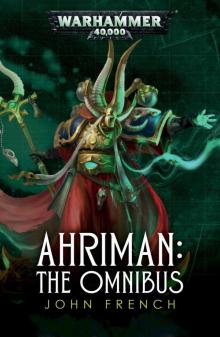 The Omnibus - John French
The Omnibus - John French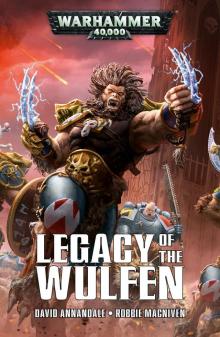 Legacy of the Wulfen - David Annandale & Robbie MacNiven
Legacy of the Wulfen - David Annandale & Robbie MacNiven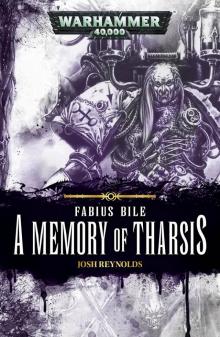 A Memory of Tharsis - Josh Reynolds
A Memory of Tharsis - Josh Reynolds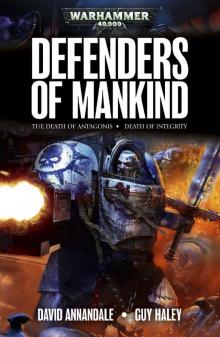 Defenders of Mankind - David Annandale & Guy Haley
Defenders of Mankind - David Annandale & Guy Haley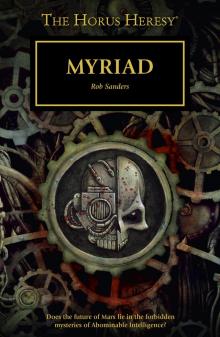 Myriad - Rob Sanders
Myriad - Rob Sanders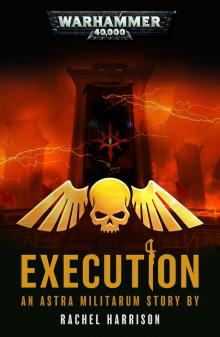 Execution - Rachel Harrison
Execution - Rachel Harrison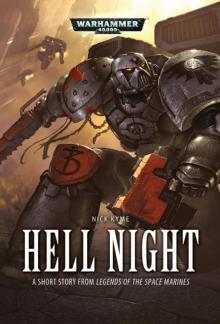 Hell Night - Nick Kyme
Hell Night - Nick Kyme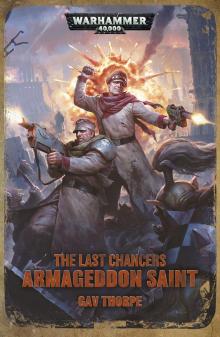 Armageddon Saint - Gav Thorpe
Armageddon Saint - Gav Thorpe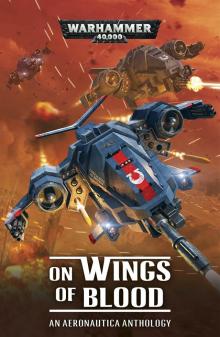 On Wings of Blood
On Wings of Blood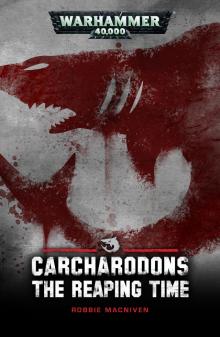 The Reaping Time - Robbie MacNiven
The Reaping Time - Robbie MacNiven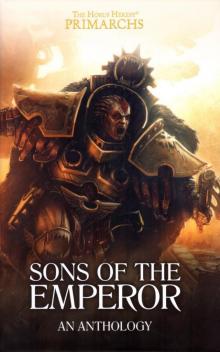 Sons of the Emperor
Sons of the Emperor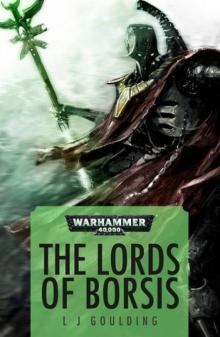 The Lords of Borsis - L J Goulding
The Lords of Borsis - L J Goulding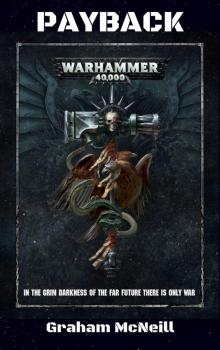 Payback - Graham McNeill
Payback - Graham McNeill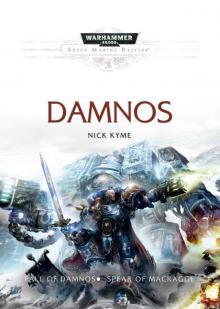 Damnos - Nick Kyme
Damnos - Nick Kyme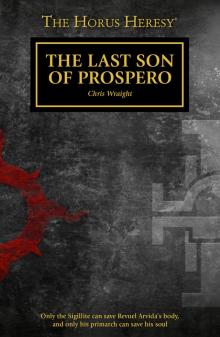 The Last Son of Prospero - Chris Wraight
The Last Son of Prospero - Chris Wraight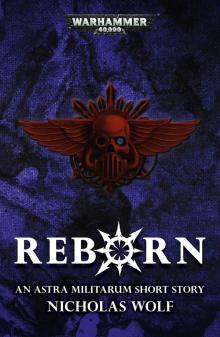 Reborn - Nicholas Wolf
Reborn - Nicholas Wolf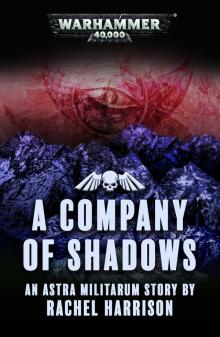 A Company of Shadows - Rachel Harrison
A Company of Shadows - Rachel Harrison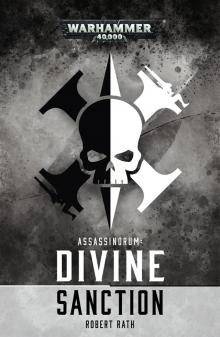 Assassinorum- Divine Sanction - Robert Rath
Assassinorum- Divine Sanction - Robert Rath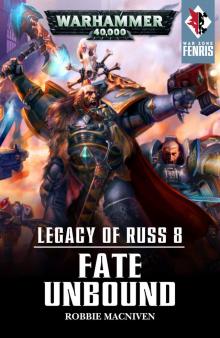 Fate Unbound - Robbie MacNiven
Fate Unbound - Robbie MacNiven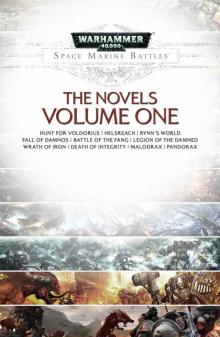 Space Marine Battles - the Novels Volume 1
Space Marine Battles - the Novels Volume 1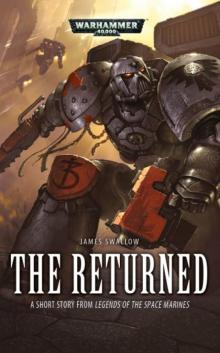 The Returned - James Swallow
The Returned - James Swallow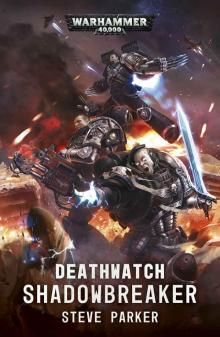 Shadowbreaker - Steve Parker
Shadowbreaker - Steve Parker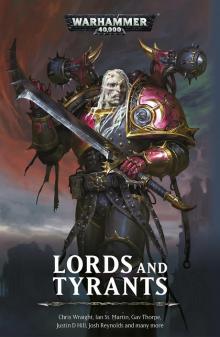 Lords and Tyrants
Lords and Tyrants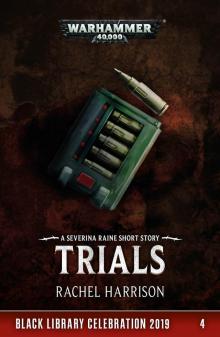 Trials - Rachel Harrison
Trials - Rachel Harrison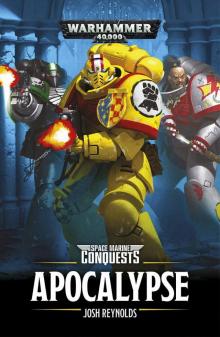 Apocalypse - Josh Reynolds
Apocalypse - Josh Reynolds The labyrinth - Richard Ford
The labyrinth - Richard Ford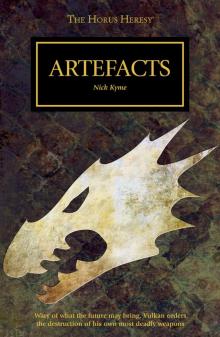 Artefacts - Nick Kyme
Artefacts - Nick Kyme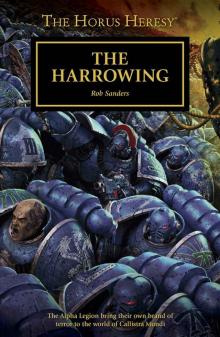 The Harrowing - Rob Sanders
The Harrowing - Rob Sanders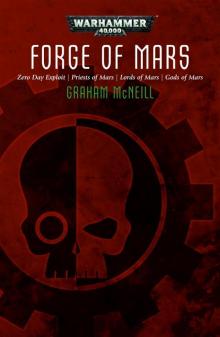 Forge of Mars - Graham McNeill
Forge of Mars - Graham McNeill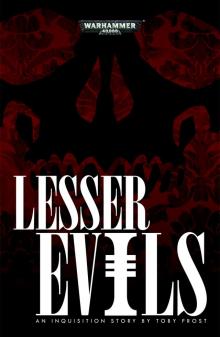 Lesser Evils - Toby Frost
Lesser Evils - Toby Frost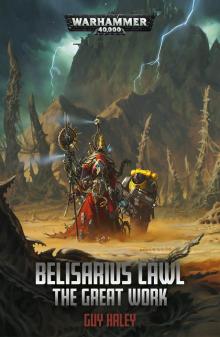 Belisarius Cawl- the Great Work - Guy Haley
Belisarius Cawl- the Great Work - Guy Haley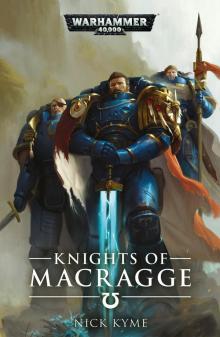 Knights of Macragge - Nick Kyme
Knights of Macragge - Nick Kyme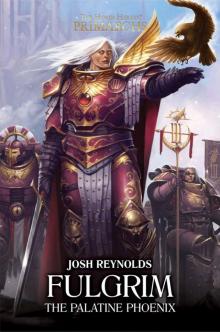 Fulgrim- The Palatine Phoenix - Josh Reynolds
Fulgrim- The Palatine Phoenix - Josh Reynolds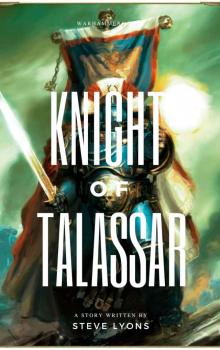 Knight of Talassar - Steve Lyons
Knight of Talassar - Steve Lyons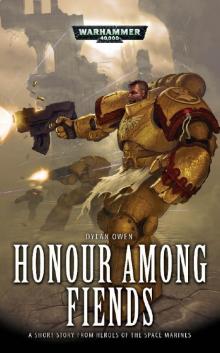 Honour Among Fiends - Dylan Owen
Honour Among Fiends - Dylan Owen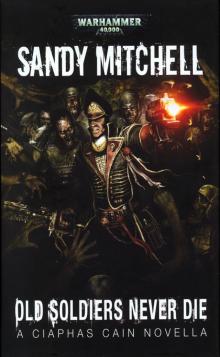 Old Soldiers Never Die - Sandy Mitchell
Old Soldiers Never Die - Sandy Mitchell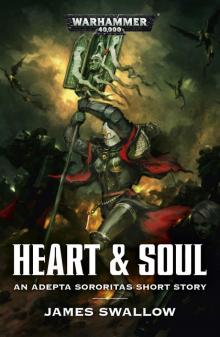 Heart & Soul - James Swallow
Heart & Soul - James Swallow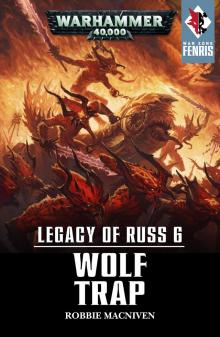 Wolf Trap - Robbie MacNiven
Wolf Trap - Robbie MacNiven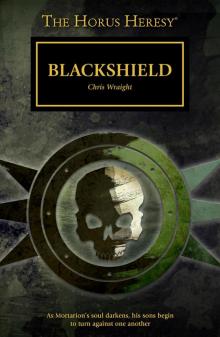 Blackshield - Chris Wraight
Blackshield - Chris Wraight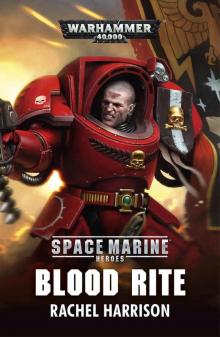 Blood Rite - Rachel Harrison
Blood Rite - Rachel Harrison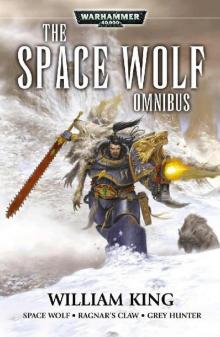 The Space Wolf Omnibus - William King
The Space Wolf Omnibus - William King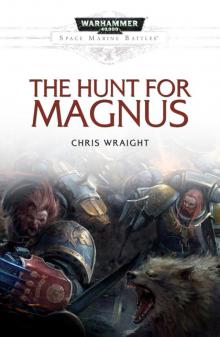 The Hunt for Magnus - Chris Wraight
The Hunt for Magnus - Chris Wraight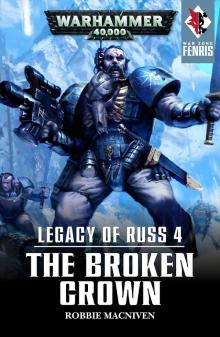 The Broken Crown - Robbie MacNiven
The Broken Crown - Robbie MacNiven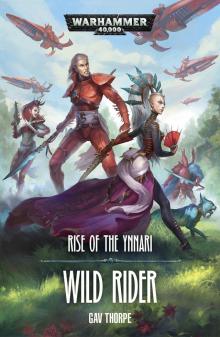 Wild Rider - Gav Thorpe
Wild Rider - Gav Thorpe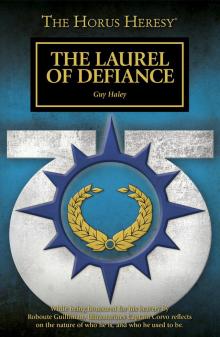 The Laurel of Defiance - Guy Haley
The Laurel of Defiance - Guy Haley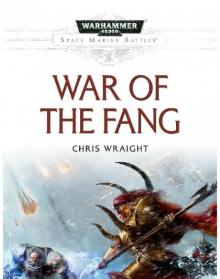 War of the Fang - Chris Wraight
War of the Fang - Chris Wraight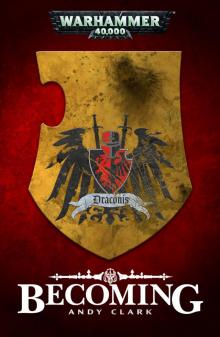 Becoming - Andy Clark
Becoming - Andy Clark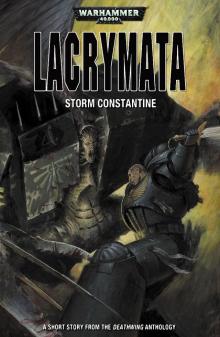 Lacrymata - Storm Constantine
Lacrymata - Storm Constantine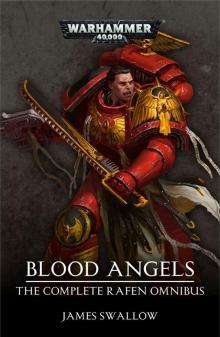 Blood Angels - The Complete Rafen Omnibus - James Swallow
Blood Angels - The Complete Rafen Omnibus - James Swallow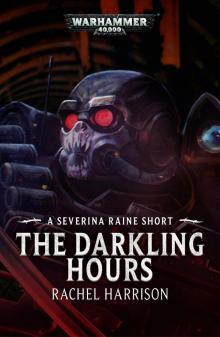 The Darkling Hours - Rachel Harrison
The Darkling Hours - Rachel Harrison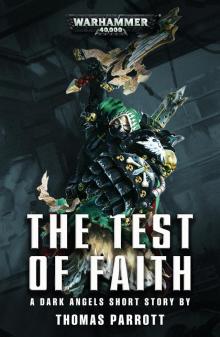 The Test of Faith - Thomas Parrott
The Test of Faith - Thomas Parrott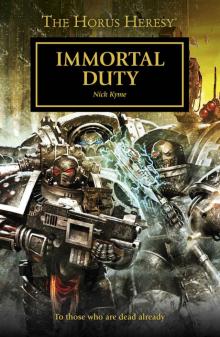 Immortal Duty - Nick Kyme
Immortal Duty - Nick Kyme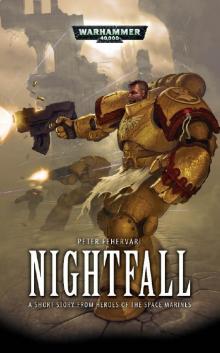 Nightfall - Peter Fehervari
Nightfall - Peter Fehervari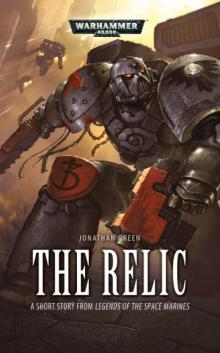 The Relic - Jonathan Green
The Relic - Jonathan Green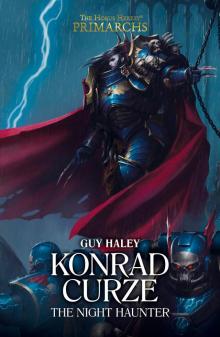 Konrad Curze the Night Haunter - Guy Haley
Konrad Curze the Night Haunter - Guy Haley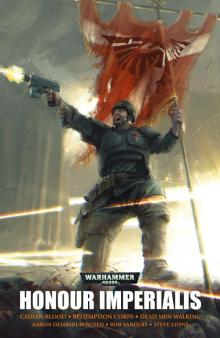 Honour Imperialis - Aaron Dembski-Bowden
Honour Imperialis - Aaron Dembski-Bowden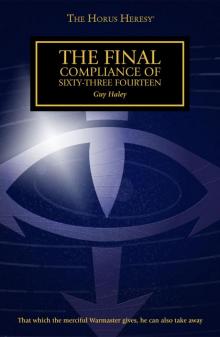 The Final Compliance of Sixty-Three Fourteen - Guy Haley
The Final Compliance of Sixty-Three Fourteen - Guy Haley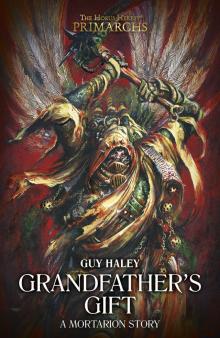 Grandfather’s Gift - Guy Haley
Grandfather’s Gift - Guy Haley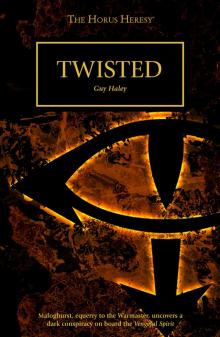 Twisted - Guy Haley
Twisted - Guy Haley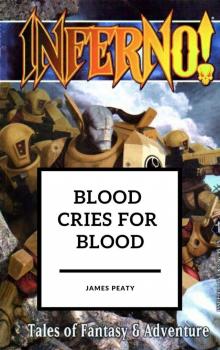 Blood Cries for Blood - James Peaty
Blood Cries for Blood - James Peaty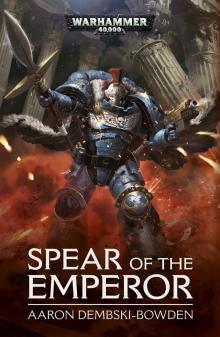 Spear of the Emperor - Aaron Dembski-Bowden
Spear of the Emperor - Aaron Dembski-Bowden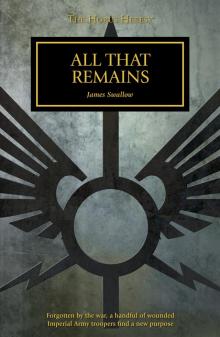 All That Remains - James Swallow
All That Remains - James Swallow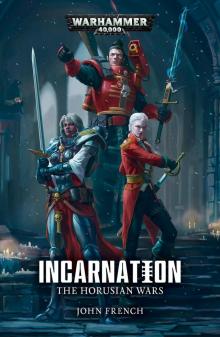 Incarnation - John French
Incarnation - John French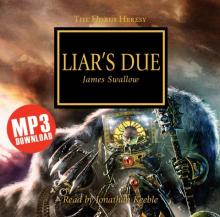 Liar's Due - Ben Swallow
Liar's Due - Ben Swallow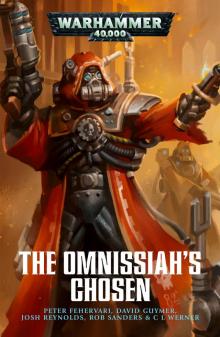 The Omnissiah's Chosen - Peter Fehervari
The Omnissiah's Chosen - Peter Fehervari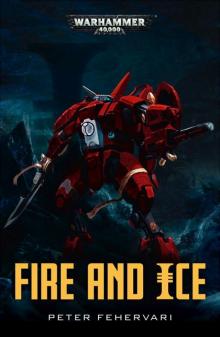 Fire and Ice - Peter Fehervari
Fire and Ice - Peter Fehervari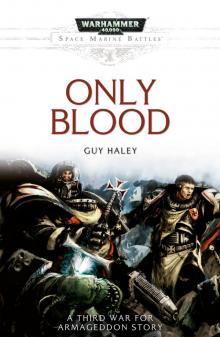 Only Blood - Guy Haley
Only Blood - Guy Haley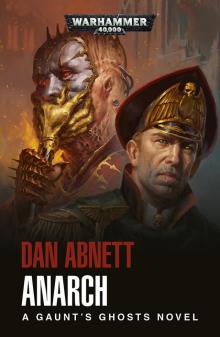 Anarch - Dan Abnett
Anarch - Dan Abnett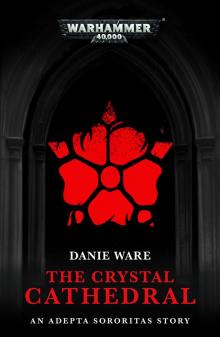 The Crystal Cathedral - Danie Ware
The Crystal Cathedral - Danie Ware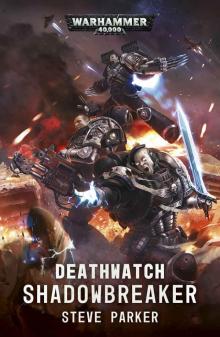 Shadowbreaker
Shadowbreaker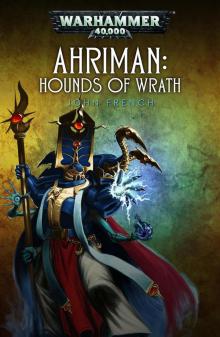 Hounds of Wrath - John French
Hounds of Wrath - John French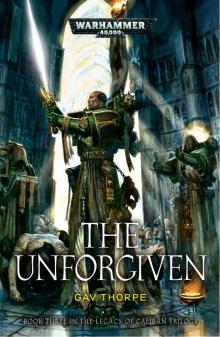 The Unforgiven - Gav Thorpe
The Unforgiven - Gav Thorpe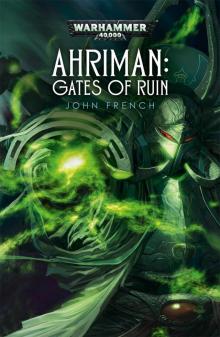 Gates of Ruin - John French
Gates of Ruin - John French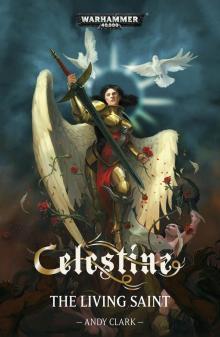 Celestine - Andy Clark
Celestine - Andy Clark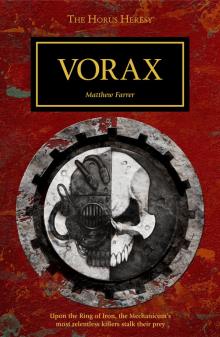 Vorax - Matthew Farrer
Vorax - Matthew Farrer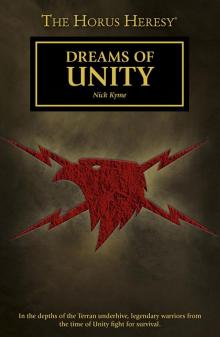 Dreams of Unity - Nick Kyme
Dreams of Unity - Nick Kyme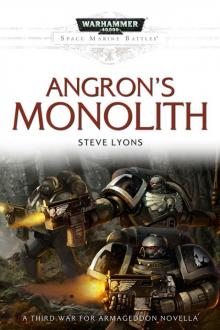 Angron's Monolith - Steve Lyons
Angron's Monolith - Steve Lyons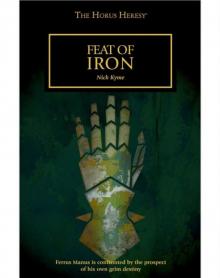 Feat of Iron - Nick Kyme
Feat of Iron - Nick Kyme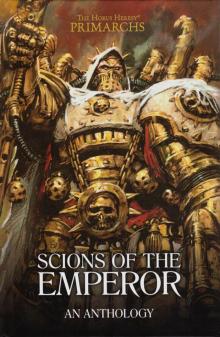 Scions of the Emperor
Scions of the Emperor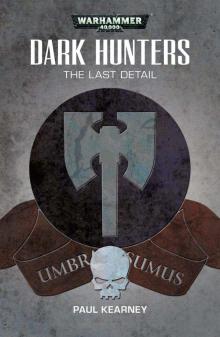 The Last Detail - Paul Kearney
The Last Detail - Paul Kearney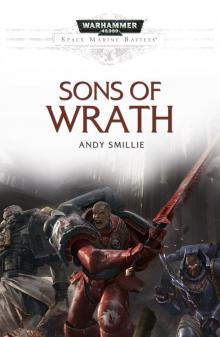 Sons of Wrath - Andy Smillie
Sons of Wrath - Andy Smillie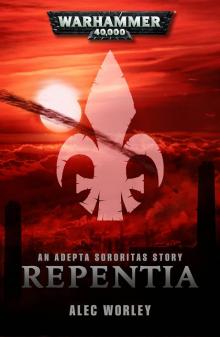 Repentia - Alec Worley
Repentia - Alec Worley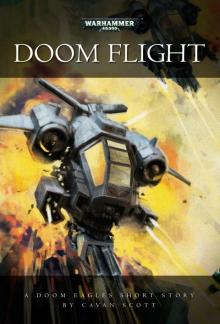 Doom Flight - Cavan Scott
Doom Flight - Cavan Scott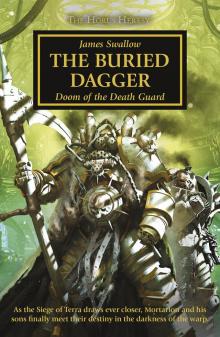 The Buried Dagger - James Swallow
The Buried Dagger - James Swallow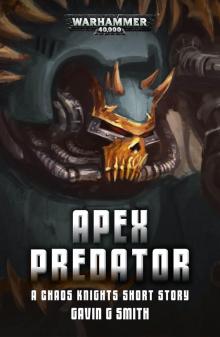 Apex Predator - Gavin G Smith
Apex Predator - Gavin G Smith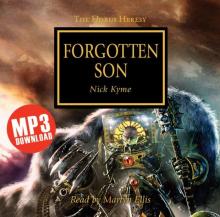 Forgotten Sons - Nick Kyme
Forgotten Sons - Nick Kyme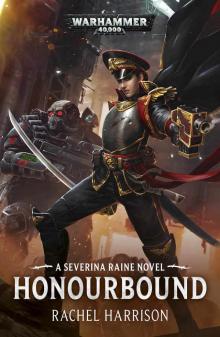 Honourbound - Rachel Harrison
Honourbound - Rachel Harrison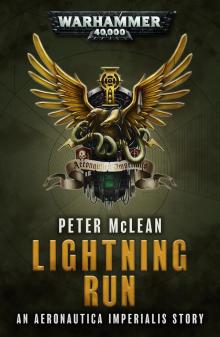 Lightning Run - Peter McLean
Lightning Run - Peter McLean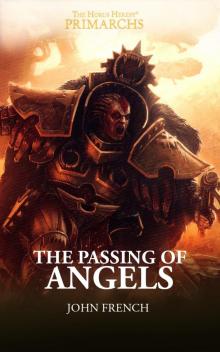 The Passing of Angels - John French
The Passing of Angels - John French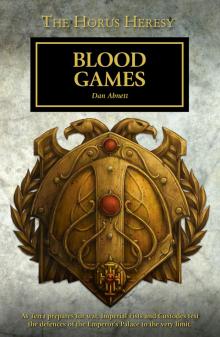 Blood Games - Dan Abnett
Blood Games - Dan Abnett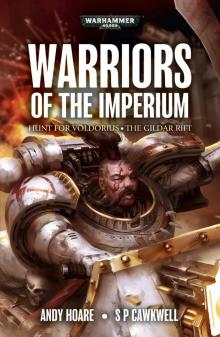 Warriors of the Imperium - Andy Hoare & S P Cawkwell
Warriors of the Imperium - Andy Hoare & S P Cawkwell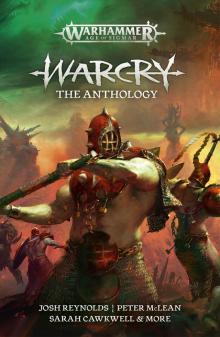 Warcry
Warcry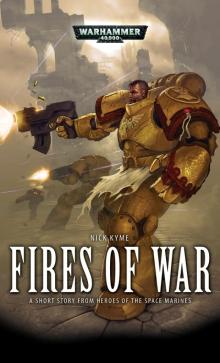 Fires of War - Nick Kyme
Fires of War - Nick Kyme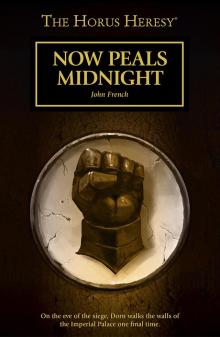 Now Peals Midnight - John French
Now Peals Midnight - John French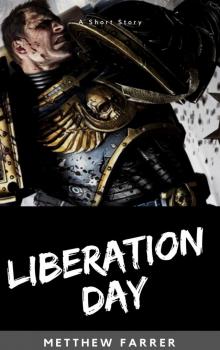 Liberation Day - Matthew Farrer
Liberation Day - Matthew Farrer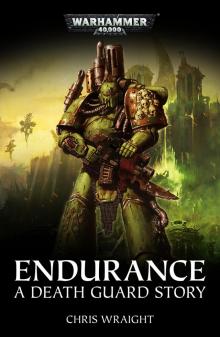 Endurance - Chris Wraight
Endurance - Chris Wraight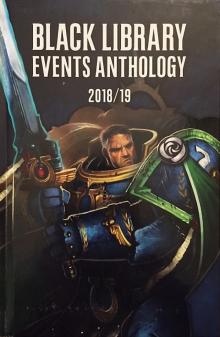 Black Library Events Anthology 2018-19
Black Library Events Anthology 2018-19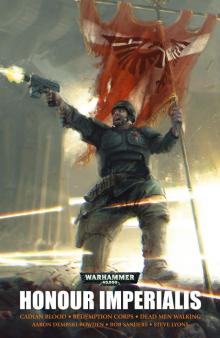 Honour Imperialis - Braden Campbell & Aaron Dembski-Bowden & Chris Dows & Steve Lyons & Rob Sanders
Honour Imperialis - Braden Campbell & Aaron Dembski-Bowden & Chris Dows & Steve Lyons & Rob Sanders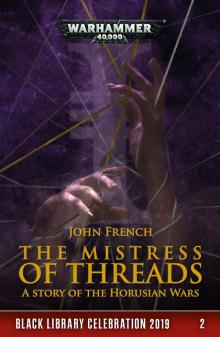 The Mistress of Threads - John French
The Mistress of Threads - John French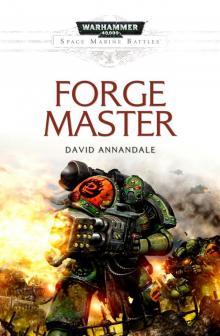 Forge Master - David Annandale
Forge Master - David Annandale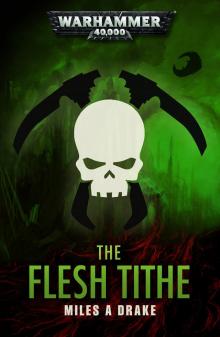 The Flesh Tithe - Miles A Drake
The Flesh Tithe - Miles A Drake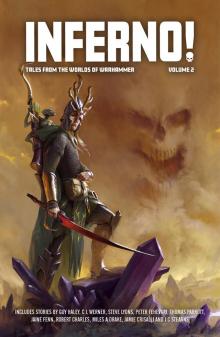 Inferno Volume 2 - Guy Haley
Inferno Volume 2 - Guy Haley Mercy of the Dragon - Nick Kyme
Mercy of the Dragon - Nick Kyme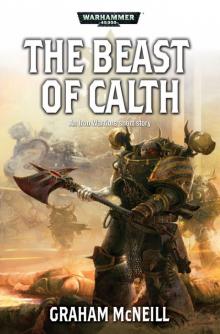 The Beast of Calth - Graham McNeill
The Beast of Calth - Graham McNeill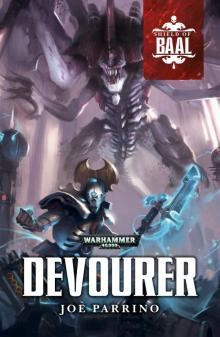 Devourer - Joe Parrino
Devourer - Joe Parrino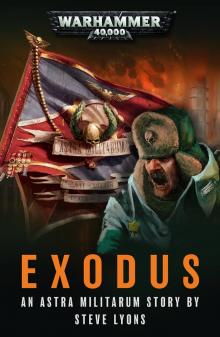 Exodus - Steve Lyons
Exodus - Steve Lyons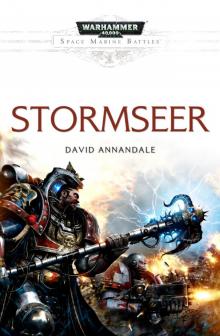 Stormseer - David Annandale
Stormseer - David Annandale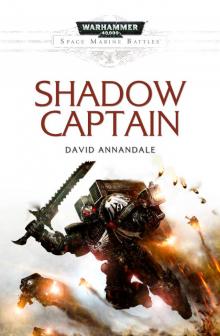 Shadow Captain - David Annandale
Shadow Captain - David Annandale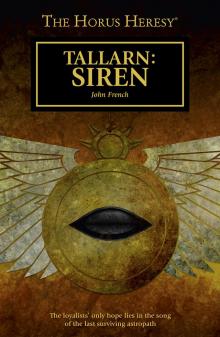 Tallarn- Siren - John French
Tallarn- Siren - John French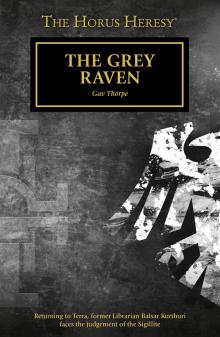 The Grey Raven - Gav Thorpe
The Grey Raven - Gav Thorpe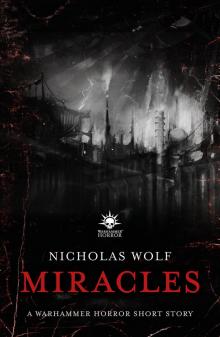 Miracles - Nicholas Wolf
Miracles - Nicholas Wolf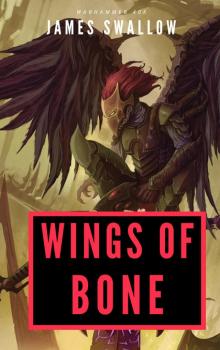 Wings of Bone - James Swallow
Wings of Bone - James Swallow